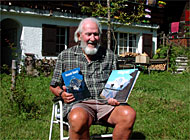Swiss author pens Nepali classic

Mount Everest had yet to be climbed, there was no road to Kathmandu, the population was only eight million and tourism was unheard of. It was the year 1950, when the Swiss geologist Toni Hagen became one of the first foreigners to enter the Himalayan Kingdom of Nepal.
Hagen, who just turned 84, eventually became an important figure for Nepal, the mountainous country to which he has dedicated much of his life.
His book “Nepal: A Kingdom in the Himalayas”, which deals with the country’s anthropology, culture and history, has become a classic reprinted in four editions since its launch in 1961. It was last updated in 1998 to update readers on the problems of modern Nepal.
The book was first published in German, French and English; a Japanese version followed in 1989. However, only this year, precisely four decades after it was first published, was Hagen’s book translated into Nepali.
The Nepali government granted him unprecedented access to the mountainous land when it entrusted him with the first geological reconnaissance survey of the country. Hagen became the first person allowed to freely move around the kingdom.
With a smile, Hagen says: “I was the eye opener of the people. I have shown the Nepalis their country like they had never seen it before.”
Freedom to roam
And move he did. When he worked for the government of Nepal and later for the United Nations, Hagen walked 14,000 km up and down mountains and through the lowlands, the Tarai. He was probably the first real trekker and there is no record of anyone who has walked as much through Nepal as he has.
When he first set foot on Nepali soil, the geologist’s passion was the Himalayas and exploring the belt of the earth’s crust that formed rocks from the bottom of the sea to mountains nearly nine kilometres high.
However, he soon learned that the Nepalese people were more intriguing than the ancient stones.
“As I went around looking at rocks, I found that the people, the culture and the history were as fascinating,” he told swissinfo.
Caring for refugees
When the Chinese invaded Tibet in 1950, it was he who made sure Nepal helped the refugees.
He set up the Tibetan refugee enclave just outside Kathmandu and helped establish carpet-weaving units to provide Tibetan women with employment. Little did he know that the carpet industry would later provide one of Nepal’s major exports.
Hagen credits both King Mahendra, who ruled at the time, and prime minister B.P. Koirala for having the courage to stand up to China in welcoming the refugees.
Hagen, who, as time went by, became more and more of a celebrity, has met many important people, including Queen Elizabeth, and developed friendships with the Dalai Lama, Edmund Hillary and the late King Birendra.
In fact, he saw the King only five days before the massacre of Nepal’s Royal Family on June 1. “The King was a great man. We were very close friends and I could always speak my mind with him. But when I saw him in Kathmandu in May, I had the feeling that it might be the last time,” he said.
Understanding the Himalayas
Earlier this year Hagen, who still exudes passion for Nepal, went to Kathmandu to set up the Toni Hagen Foundation. The foundation will promote an understanding of Himalayan geography, economy and culture among the people of the Himalayas.
With regard to Nepal’s future, he feels very positive. He believes the new prime minister, who took over after Girija Prasad Koirala stepped down in July, will be good for Nepal. “I am sure he will make some positive changes to the country and follow a democratic path.”
Full of ideas and plans for the future, Hagen is working on a film about his life, which will be screened in Switzerland at the end of this year. He is also planning to write about his experiences working for the United Nations, which, he said, could read like a crime story.
Hagen lives with his wife Gertrud in Lenzerheide and still travels to Nepal four times a year.
by Billi Bierling

In compliance with the JTI standards
More: SWI swissinfo.ch certified by the Journalism Trust Initiative








You can find an overview of ongoing debates with our journalists here . Please join us!
If you want to start a conversation about a topic raised in this article or want to report factual errors, email us at english@swissinfo.ch.